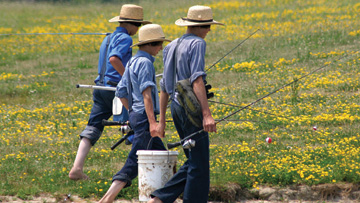You have free articles remaining this month.
Subscribe to the RP Witness for full access to new articles and the complete archives.
After retiring, my father moved to a house in Paradise, Pa., in the heart of “Pennsylvania Dutch Country,” a label descended from a misnomer describing the Amish who still flourish there. My father’s next-door neighbors are an Amish farmer and his family. Just five minutes away was an Amish schoolhouse that now is a field of dirt and a silent memorial.
Visiting my father in the last several years has torn down many of the stereotypes of the Amish. My childhood impressions were as one-dimensional as the cartoonish depictions of them in the Lancaster County tourist traps. Those who dare to venture off Route 30 onto two-lane roads to enjoy a leisurely ride in the country will have the pleasure of seeing not the stereotypes of the Amish but the Amish people themselves as they go about their daily routines—plowing fields, washing clothes, playing at recess, riding the scooter to the store. They seem quaint, and still a curiosity, but ever so human as the rest of us.
Everyone should have neighbors like my father’s. They are kind, generous, hard working, friendly, thoughtful. They have helped my father often, and have hosted him at dinner. When some Christmas lambs were born at their farm a couple years ago, they invited our extended family to the farm to witness the unusual event. Even our noisy “English” ways and our cameras (to photograph the lambs) didn’t break their quiet and unassuming grace.
Those same neighbors, however, were touched by grief on the day of the schoolhouse shooting. Two of their relatives were shot, one fatally. That courageous girl who died was a heroine of the day, asking to take a bullet in the place of others. Like you, I can scarcely find words to respond to that scene.
One emotion that all have shared with the Amish in the last month is compassion. And there are things that can be done with that compassion. Religiously, the Amish are also much more complex than the stereotype. Because they are overseen by regional bishops, and bishops set all the standards, their beliefs and practices differ widely. No doubt there are some Amish who know Christ as Savior, just as surely as there are many Amish who are blind to His saving grace and even view forgiveness as a task and a fatalistic discipline. I don’t know hearts, but I do know that the Amish are far more open to “outside contact” than the stereotype would suggest. That is also true of many other people around us that we shrink from making contact with—Muslims, Jews, atheists, cult members—perhaps because we see their world as impenetrable and our acquaintance unwelcome. The gospel, however, has a supernatural way of breaking down barriers, does it not?
